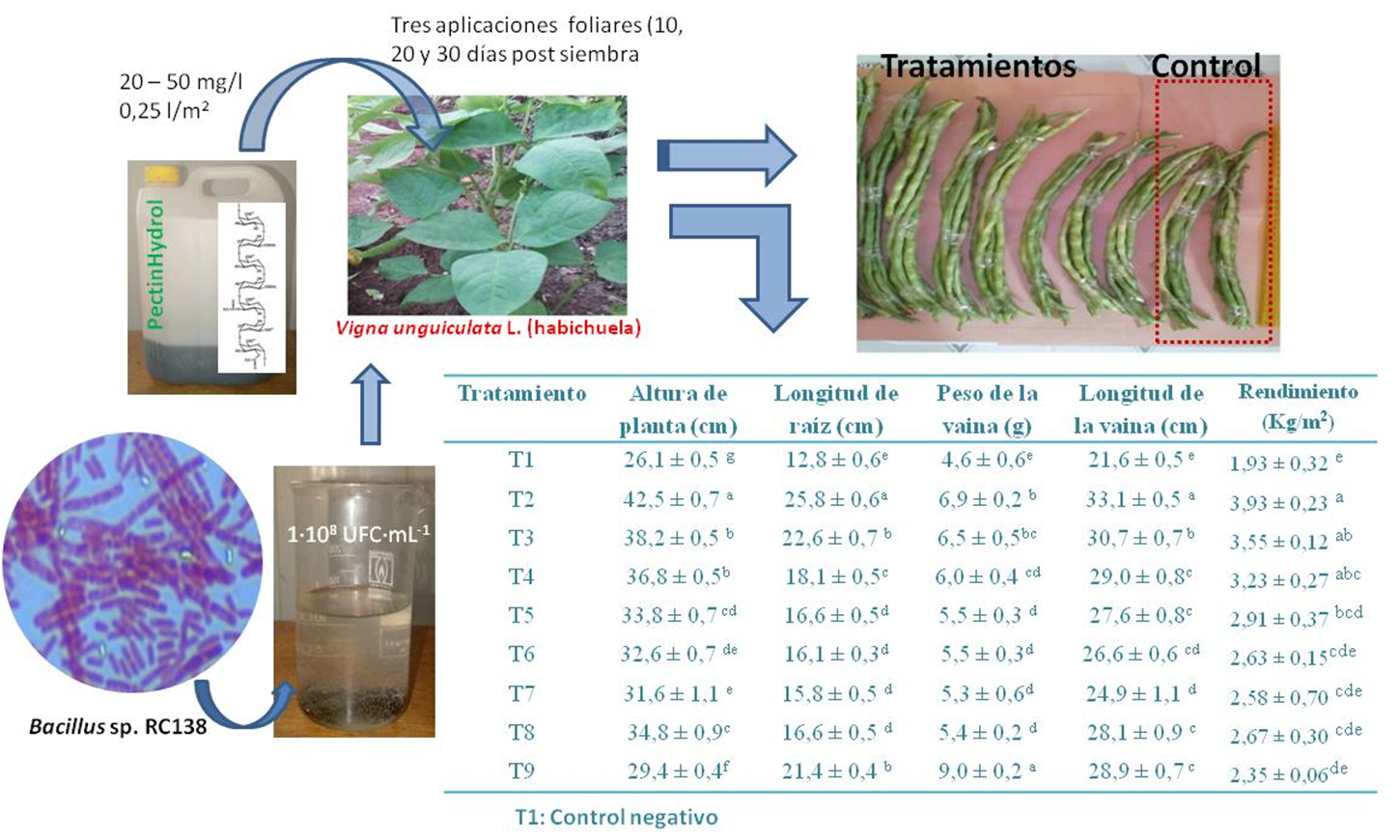COMBINED EFFECT OF RHIZOBACTERIA AND OLIGOGALACTURONIDES ON THE GROWTH STIMULATION AND YIELD OF BEAN (Vigna unguiculata L)
Keywords:
Vigna ungiculata L.; bioestimulante; oligogalacturónidos; rizobacteria promotora del crecimiento vegetalAbstract
The use of rhizobacteria to promote plant growth is an alternative to the use of chemical fertilizers,
and an ecosystem-friendly option. This research explored the effect of the bacterial inoculant
Bacillus sp. RC138 and three doses of the biostimulant PectinHydrol on morphometric and
productive indicators (plant height, root length, weight and length of pods and yield) of the bean
(Vigna unguiculata L.) variety Lina. A randomized block design of nine treatments with four
replicates was used; the experimental data were processed by mean of a two-factor analysis to
determine the influence of stimulant and bacteria. The positive and determinant effect of the
bacteria combined with the biostimulant PectinHydrol on the parameters evaluated was
demonstrated. The application of the rhizobacterium RC138 in conjunction with PectinHydrol at
20 mg∙L-1was the best combination (p < 0,05). The obtained results offer a new agroecological
alternative for sustainable bean production.
References
DUBEY, R. K. et al. “Role of plant growthpromoting microorganisms in sustainable agriculture
and environmental remediation”. En: SINGH, H. B.;
SARMA, B. K. y KESWANI, C. (Eds.). Advances in
PGPR Research. Boston: CAB International, 2017,
pp. 75-125. ISBN:
https://lccn.loc.gov/2017016222
ORTIZ-CASTRO, R.; LÓPEZ-BUCIO, J. S.;
LÓPEZ-BUCIO, J. “Physiological and molecular
mechanisms of bacterial phytostimulation”. En:
SINGH, H. B.; SARMA, B. K. y KESWANI, C.
(Eds.). Advances in PGPR Research . Boston: CAB
International, 2017, pp.16-28., ISBN:
https://lccn.loc.gov/2017016222
OLENSKA, E. et al. “Beneficial features of plant
growth-promoting rhizobacteria for improving plant
growth and health in challenging conditions: A
methodical review”, Science of the Total
Environment. 2020, 743, 140682. Doi:
https://doi.org/10.1016/j.scitotenv.2020.140682
BLANCO, E. L.; CASTRO, Y. "Antagonismo de
rizobacterias sobre hongos fitopatógenos, y su actividad
microbiana con potencial biofertilizante, bioestimulante
y biocontrolador”, Rev. Colomb. Biotecnol. 2021, 23(1),
-16. Doi:
https://doi.org/10.15446/rev.colomb.biote.v23n1.84808
PRASAD, M.; SRINIVASAN, R.; CHAUDHARY,
M.; CHOUDHARY, M.; JAT, L. K. “Plant growth
promoting rhizobacteria (PGPR) for sustainable
agriculture: perspectives and challenges”. En: SINGH,
A. K.; KUMAR, A.; SINGH, P. K.(Eds.). PGPR
Amelioration in Sustainable Agriculture. Elsevier
Inc., 2019, Cap. 7., pp.129-157. Doi:
https://doi.org/10.1016/b978-0-12-815879-1.00007-0
LARA, D.; COSTALES, D.; FALCÓN, A. “Los
oligogalacturónidos en el crecimiento y desarrollo de
las plantas”. Cultivos Tropicales. 2018, 39(2), 127-
http://scielo.sld.cu/pdf/ctr/v39n2/ctr20218.pdf
MARTÍNEZ-GÓMEZ, S.; FERNÁNDEZBAUTISTA, M.; RIVAS, S.; YÁÑEZ, R.; ALONSO,
J. L. "Recent advances in the production of
oligogalacturonides and their biological properties”.
Food Funct. 2023, 14, 4507-4521. Doi:
https://doi.org/10.1039/d3fo00327b
REYES-PÉREZ, J. J.; RAMOS-REMACHE, R. A.;
LLERENA-RAMOS, L. T.; RAMÍREZARREBATO, M. A.; FALCÓN-RODRÍGUEZ, A. B.
“Potencialidades de oligogalacturónidos y
quitosacáridos en el enraizamiento de las plantas”.
Terra Latinoamericana. 2021, 39, 1-9. e846.
https://doi.org/10.28940/terra.v39i0.846
DEL ÁNGEL, V. (2007). Estudio de la cadena
agroalimentaria de habichuelas en República
Dominicana. http://www.iicard.org/areastematicas/cadenasagroalim
entarias/Cadena%20Agroalimentaria%20de%20Habic
huelas.pdf
RODRÍGUEZ-FERNÁNDEZ, P. “Impacto del
lixiviado de humus de lombriz sobre el crecimiento y
productividad del cultivo de habichuela (Vigna
unguiculata L. Walp)”, Ciencia en su PC. 2017, 2,
-58.
https://www.redalyc.org/pdf/1813/181351615003.pdf
NÁPOLES, S.; GARZA, T.; REYNALDO, I.
“Respuesta del cultivo de habichuela (Vigna
unguiculata L.) var. Lina a diferentes formas de
aplicación del Pectimorf”. Cultivos Tropicales . 2016,
(3), 172-177. ISSN: 1819-4087. Doi:
https://doi.org/10.13140/RG.2.1.1878.1688
MONTERO, C. (2018). Efectos de Brevibacillus
borstelensis B65 y el bioestimulante PectinHydrol en
el cultivo de la Zanahoria (Daucus carota L.). Tesis
para optar por el título de Máster en Biotecnología.
Facultad de Ciencias Naturales y Exactas,
Universidad de Oriente, Santiago de Cuba, Cuba.
, 48 p.
CALERO-HURTADO, A. et al. “Efecto entre
microorganismos eficientes y Fitomas-E en el
incremento agroproductivo del frijol”. Biotecnología
en el sector agropecuario y agroindustrial.
,17(1), 25-33. Doi:
https://doi.org/10.18684/bsaa.v17n1.1201
LARA-ACOSTA, D., COSTALES-MENÉNDEZ,
D., NÁPOLES-GARCÍA, M. C., FALCÓNRODRÍGUEZ, A. "Pectimorf® and Azofert-F® in the
growth of vean plants (Phaseolus vulgarisL.)”,
Cultivos Tropicales. 2019, 40(4), e05.
http://scielo.sld.cu/scielo.php?pid=S0258-
&script=sci_arttext&tlng=pt
GEBREEGZIABHER, B. G.; QUFA, C.A. "Plant
physiological stimulation by seeds salt priming in
maize (Zea mays): Prospect for salt tolerance”.
African Journal of Biotechnology. 2017,16, 209-223.
Doi: https://doi.org/10.5897/AJB2016.15819
SÁNCHEZ, D.; GONZÁLEZ, L.; DEL MONTEMARTÍNEZ, A.; ROJAS, M. M. “Factibilidad
biológica del uso de cepas de Bacilli productoras de
ácido 3-indolacético en el crecimiento in vitro del
cultivo del arroz”. Revista Cubana de Ciencias
Biológicas. 2019, 7(1), 1-10. ISSN: 2307-695X.
http://www.rccb.uh.cu/index.php/RCCB/article/view/
/336
GOWTHAM, H. G.; DURAIVADIVEL, P.;
HARIPRASAD, P.; NIRANJANA, S. R. "A novel
split-pot bioassay to screen indole acetic acid
producing rhizobacteria for the improvement of plant
growth in tomato ENT[Solanum lycopersicum
L.ENT]”. Scientia Horticulturae. 2017, 224, 351-357.
Doi: https://doi.org/10.1016/j.scienta.2017.06.017
WAGI, S.; AHMED, A. “Bacillus spp.: potent
microfactories of bacterial IAA”. Peer J. 2019, 7,
e7258. Doi. https://doi.org/10.7717/peerj.7258
OLOYEDE, A. R.; OJO, A. E.; AJIJOLA, W. R.
“Exogenous inoculation of seed with plant growthpromoting rhizobacteria effectively enhanced growth
of cucumber in a greenhouse”. West African Journal
of Applied Ecology. 2024, 32(1), 22-36.
https://www.ajol.info/index.php/wajae/article/view/27
FALCÓN, A. B.; COSTALES, D.; GONZÁLEZPEÑA D.; NÁPOLES M. C. “Nuevos productos
naturales para la agricultura: las oligosacarinas”.
Cultivos Tropicales. 2015, 36, 111-129.
http://scielo.sld.cu/pdf/ctr/v36n/ctr10s115.pdf
NÚÑEZ, M.; MARTÍNEZ, L.; REYES, Y.
“Oligogalacturónidos estimulan el crecimiento de
plántulas de arroz cultivadas en medio salino”. Cultivos
Tropicales. 2018, 39(2), 96-100. ISSN: 1819-4087.
http://scielo.sld.cu/pdf/ctr/v39n2/ctr13218.pdf
ZHAO, C. et al. "Effect of oligogalacturonides on
seed germination and disease resistance of sugar beet
seedling and root”. J. Fungi. 2022, 8, 716.
https://doi.org/10.3390/jof8070716
AGBODJATO, N. A.; NOUMAVO, P. A.;
ADJANOHOUN, A.; AGBESSI, L.; BABAMOUSSA, L. “Synergistic effects of plant growth
promoting rhizobacteria and chitosan on in vitro seeds
germination, greenhouse growth, and nutrient uptake
of maize (Zea mays L.)”. Biotechnology Research
International. 2016, 1, 7830182.
http://dx.doi.org/10.1155/2016/7830182
ROPHAEL, Y.; COLLA, G. “Synergistic
biostimulatory action: designing the next generation
of plant biostimulants for sustainable
agriculture”,Front. Plant Sci. 2018, 9, 1655. Doi:

Downloads
Published
How to Cite
Issue
Section
License
Copyright (c) 2025 Irasema Pérez-Portuondo, Ariel López-Duany, Rosa M. Pérez-Silva, Arelis Abalos-Rodríguez, Manuel Serrat-Díaz

This work is licensed under a Creative Commons Attribution-NonCommercial-NoDerivatives 4.0 International License.
This journal provides immediate open access to its content, based on the principle that offering the public free access to research helps a greater global exchange of knowledge. Each author is responsible for the content of each of their articles.






















